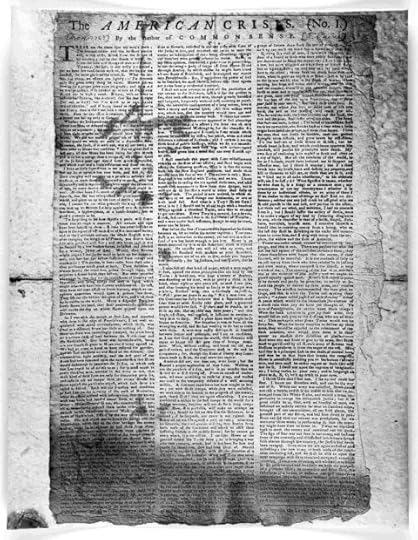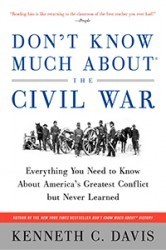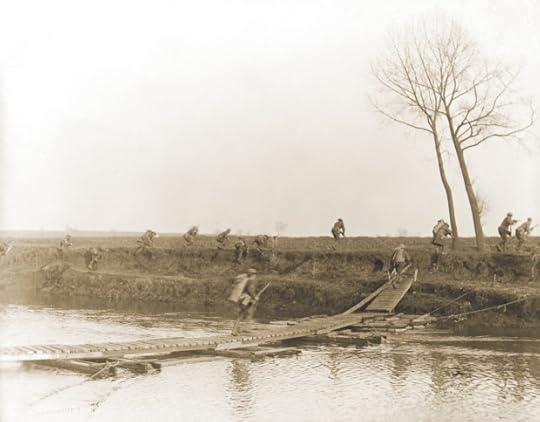Kenneth C. Davis's Blog, page 62
November 20, 2016
IN THE SHADOW OF LIBERTY: “Best Children’s and Young Adult Books of 2016”
The Washington Post has named In the Shadow of Liberty: The Hidden History of Slavery, Four Presidents, and Five Black Lives one of its Best Children’s and Young Adult Books of 2016.
Davis looks at five people who were enslaved by presidents before and after the American Revolution as a corrective to history books that hide or play down slavery’s role in the United States. Details about these enslaved people are known because of their connection to powerful men, but Davis makes clear that they were impressive people in their own right.
—“Best Children’s and Young Adult Books of 2016,”Washington Post (November 17, 2016)

In the Shadow of Liberty (Available for pre-order and in stores on 9/20)
Who Said It? (11/20/2016)
 Thomas Paine, The American Crisis (No. 1) (December 1776)
Thomas Paine, The American Crisis (No. 1) (December 1776)
It was the darkest hour in the American revolution.
When Fort Lee in New Jersey fell to the British on November 20, 1776, the Continental Army led by George Washington was forced to retreat into Pennsylvania after a series of crushing defeats. The rebellion was on the verge of collapse.
The same man who had anonymously published Common Sense wrote a clarion call to service in the patriot cause. First in a series of pamphlets, Thomas Paine’s The American Crisis (No. 1) was published in December 1776 and Washington had it read to his demoralized troops.
THESE are the times that try men’s souls: The summer soldier and the sunshine patriot will, in this crisis, shrink from the service of his country but he that stands it NOW, deserves the love and thanks of man and woman. Tyranny, like hell, is not easily conquered; yet we have this consolation with us, that the harder the conflict, the more glorious the triumph. What we obtain, too cheap, we esteem too lightly….
It matters not where you live, or what rank of life you hold, the evil or the blessing will reach you all. The far and the near, the home counties and the back, the rich and the poor, shall suffer or rejoice alike. The heart that feels not now, is dead: The blood of his children shall curse his cowardice, who shrinks back at a time when a little might have saved the whole, and made them happy. I love the man that can smile in trouble, that can gather strength from distress, and grow brave by reflection. ‘Tis the business of little minds to shrink; but he whose heart is firm, and whose conscience approves his conduct, will pursue his principles unto death.
Source and Complete Text: Library of Congress “Thomas Paine Writes ‘The American Crisis'”
Important words to remember. America has survived many great crises. But it has required courage and persistence. “Tyranny, like hell, is not easily conquered.”
November 18, 2016
Don’t Know Much About® Executive Order 9066
“Trump Camp’s Talk of Registry and Japanese Internment Raises Muslim Fears” (New York Times, November 17, 2016)
It raises the fears of anyone who knows what “Internment” means. This is an update of a post published in February 2015 but reposted today in light of comments made by a prominent supporter of president-elect Trump, as reported in the New York Times.

Dorothea Lange
In this 1942 Dorothea Lange photograph from the book “Impounded,” a family in Hayward, Calif., awaits an evacuation bus.
Franklin D. Roosevelt famously told Americans when he was inaugurated in 1933:
The only thing we have to fear is fear itself
But on February 19, 1942 –a little more than two months after the attack on Pearl Harbor— President Roosevelt allowed America’s fear to provoke him into an action regarded among his worst mistakes. He issued Executive Order 9066.
The result of this Executive Order was the policy of “relocating” some 120,000 Japanese Americans, and a smaller number of German and Italian Americans, into “internment camps.”
I have written about the subject of the internment of the Japanese American population in the past. I relink these today, including this post on the birthday of Ansel Adams, who photographed the internment camp at Manzanar, and another on photojournalist Dorothea Lange, who also documented the period. Both of these posts include links to other resources on the history of “Internment.”

Photo: (National Park Service, Jeffery Burton, photographer
Among these resources is a site devoted to the War Relocation Camps –a Teaching With Historic Places Lesson Plan from the National Park Service called “When Fear Was Stronger than Justice.”
November 17, 2016
IN THE SHADOW OF LIBERTY: A “Best Children’s and Young Adult Book of 2016”
The Washington Post has named In the Shadow of Liberty: The Hidden History of Slavery, Four Presidents, and Five Black Lives one of its Best Children’s and Young Adult Books of 2016.
Davis looks at five people who were enslaved by presidents before and after the American Revolution as a corrective to history books that hide or play down slavery’s role in the United States. Details about these enslaved people are known because of their connection to powerful men, but Davis makes clear that they were impressive people in their own right.
—“Best Children’s and Young Adult Books of 2016,”Washington Post (November 17, 2016)

In the Shadow of Liberty (Available for pre-order and in stores on 9/20)
November 13, 2016
Who Said It (11/13/2016)
Abraham Lincoln, The Gettysburg Address (November 19, 1863)
“Fourscore and seven years ago our fathers brought forth on this continent a new nation, conceived in liberty and dedicated to the proposition that all men are created equal. Now we are engaged in a great civil war, testing whether that nation or any nation so conceived and so dedicated can long endure. We are met on a great battlefield of that war. We have come to dedicate a portion of that field as a final resting-place for those who here gave their lives that that nation might live. It is altogether fitting and proper that we should do this. But in a larger sense, we cannot dedicate, we cannot consecrate, we cannot hallow this ground. The brave men, living and dead who struggled here have consecrated it far above our poor power to add or detract. The world will little note nor long remember what we say here, but it can never forget what they did here. It is for us the living rather to be dedicated here to the unfinished work which they who fought here have thus far so nobly advanced. It is rather for us to be here dedicated to the great task remaining before us–that from these honored dead we take increased devotion to that cause for which they gave the last full measure of devotion–that we here highly resolve that these dead shall not have died in vain, that this nation under God shall have a new birth of freedom, and that government of the people, by the people, for the people shall not perish from the earth.”
Complete Text Source: Avalon Project/Yale Law School
Learn more about the Gettysburg Address in Don’t Know Much About the Civil War and more about American slavery and the presidency in IN THE SHADOW OF LIBERTY.

Don’t Know Much About the Civil War (Harper paperback, Random House Audio)

In the Shadow of Liberty
November 12, 2016
In the Shadow of Liberty-NYT Book Review
In the Shadow of Liberty: The Hidden History of Slavery, Four Presidents, and Five Black Lives is reviewed in the November 13, 2016 issue of the New York Times Book Review:
Similarly, Davis never shies away from the grotesque paradox of our nation’s most eloquent proponents of liberty denying that precious right to so many of their countrymen. Still, his primary mission is to illuminate the interior lives of the men and women forced into lives of ceaseless labor.
The complete review: “Black Lives Didn’t Matter” by Jabari Asim

In the Shadow of Liberty (Available for pre-order and in stores on 9/20)
The book has also received excellent advance reviews from Publishers Weekly, School Library Journal, and Booklist.
Both the hardcover and audio versions of the book are available for purchase online
November 11, 2016
Veterans, Poppies, and “In Flanders Fields”

Soldiers of the 146th Infantry, 37th Division, crossing the Scheldt River at Nederzwalm under fire. Image courtesy of The National Archives.
One of the most famous symbols of the sacrifice and loss we mark on Veterans is the Poppy, inspired by this World War I poem, “In Flanders Fields,” written by John McCrae.

John McCrae, a Canadian doctor and teacher who is best known for his memorial poem “In Flanders Fields,”
In Flanders fields the poppies blow
Between the crosses, row on row,
That mark our place, and in the sky,
The larks, still bravely singing, fly,
Scarce heard amid the guns below.
We are the dead; short days ago
We lived, felt dawn, saw sunset glow,
Loved and were loved, and now we lie
In Flanders fields.
Take up our quarrel with the foe!
To you from failing hands we throw
The torch; be yours to hold it high!
If ye break faith with us who die
We shall not sleep, though poppies grow
In Flanders fields.
Source: The poem is in the public domain courtesy of Poets.org
“Soon after writing “In Flanders Field,” McCrae was transferred to a hospital in France, where he was named the chief of medical services. Saddened and disillusioned by the war, McCrae found respite in writing letters and poetry, and wrote his final poem, “The Anxious Dead.”
In the summer of 1917, McCrae’s health took a turn, and he began suffering from severe asthma attacks and bronchitis. McCrae died of pneumonia and meningitis on January 28, 1918.” (Poets.org)
Inspired by McCrae’s poem, an American woman, Moina Michael originated the idea of wearing red poppies to honor the war dead. She sold poppies with the money going to benefit servicemen, and the movement caught on, spreading to Europe as well. In 1948, Moina Michael was honored for founding the Poppy Movement with a red 3 cent postage stamp.
November 1, 2016
Now Available: “In the Shadow of Liberty”
The first reviews are in for In the Shadow of Liberty: The Hidden History of Slavery, Four Presidents, and Five Black Lives. (Holt Books for Young Readers/Penguin Random House Audio, September 20, 2016)
[UPDATED October 10, 2016]
*Publishers Weekly in a *Starred Review:
“–delivers an eye-opening vision of ‘stubborn facts’ in American history…”
Read the complete Publishers Weekly review here.
*School Library Journal in a *Starred Review has called the book:
“Compulsively readable….”
Read the complete School Library Journal review here.

In the Shadow of Liberty (Available for pre-order and in stores on 9/20)
*Booklist *Starred Review said:
“A valuable, broad perspective on slavery, paired with close-up views of individuals who benefited from it and those who endured it.” Booklist
Kirkus has called the book:
“An important and timely corrective.” Kirkus
In the Nonfiction Book of the Week, Horn Books says:
“Davis’s solid research (there are source notes and bibliographies for each chapter), accessible prose, and determination to make these stories known give young readers an important alternative to textbook representations of colonial life.”
In the Shadow of Liberty is now available from Holt Books for Young Readers and Penguin Random House Audio.
October 28, 2016
Don’t Know Much About® Fascism
On October 28, 1922, Fascism came to Italy as Benito Mussolini took control of the government. (New York Times Learning Network)
In the midst of the current presidential campaign, the word “fascist” has been tossed about quite a bit. It is the political “F-word,” most associated with World War II dictators, Italy’s Benito Mussolini and Germany’s Adolf Hitler.

Hitler (r) and Mussolini (l) ca. June 1940. Part of Eva Braun’s Photo Albums, ca. 1913 – ca. 1944, seized by the U.S. government. This image is available from the Online Public Access (OPA) of the United States National Archives and Records Administration under the National Archives Identifier 540151. (Source: National Archives.
Lately, the term has been used specifically with respect to Republican frontrunner Donald Trump. Conservative columnist Ross Douthat asked in a New York Times Op-Ed “Is Donald Trump a Fascist?”
But what does this widely used word “fascist” mean?
Generally, fascism describes a military dictatorship built on racist and powerfully nationalistic foundations, generally with the broad support of the business class (distinguishing it from the collectivism of Communism).
Benito Mussolini (1883–1945), called Il Duce (which simply means “the leader”), was the son of a blacksmith, who came to power as prime minister in 1922. A preening bully of a man, he organized Italian World War I veterans into the anti-Communist and rabidly nationalistic “blackshirts,” a paramilitary group that used gang tactics to suppress strikes and attack leftist trade unions.
In 1925, Mussolini installed himself as head of a single-party state he called fascismo. The word came from fasces, a Latin word referring to a bundle of rods bound around an ax, which had been an ancient Roman symbol of authority and strength.

Flag of the Prime Minister of the Kingdom of Italy first used in 1927 when Benito Mussolini served as Prime Minister. The flag was used until 1943, when Fascism was banned in Italy. (Source: Wikipedia Public Domain)
Mussolini blamed Italy’s problems on foreigners, and promised to make the trains run on time. (Contrary to popular belief, he did not.)
The rise to power of the three militaristic, totalitarian states that would form the wartime Axis—Germany, Japan, and Italy—as well as Fascist Spain under General Franco, can be laid to the aftershocks, both political and economic, of the First World War. It was rather easy, especially in the case of Germany and Italy, for demagogues to point to the smoldering ruins of their countries and the economic disaster of the worldwide Depression and blame their woes on foreigners.
In Germany, Adolf Hitler (1889–1945) made scapegoats not only of the Communists and foreign powers who he claimed had stripped Germany of its land and military abilities at Versailles, but also of Jews, who he claimed were in control of the world’s finances.
The rest, as they say, is history.
(This text is adapted from Don’t Know Much About® History, “Who were the Fascists?” pages 361-365).

Don’t Know Much About® History: Anniversary Edition

October 18, 2016
Did you know: What Washington got when the British surrendered at Yorktown
Answer: All of the enslaved people in Yorktown who had escaped to the British in hopes of freedom.

Surrender of Lord Cornwallis by John Trumbull (Source: Architect of the U.S. Capitol)
When the British forces under Cornwallis surrendered to George Washington and his French allies on October 19, 1781, the terms of capitulation included the following phrase
It is understood that any property obviously belonging to the inhabitants of these States, in the possession of the garrison, shall be subject to be reclaimed.
(Article IV, Articles of Capitulation; dated October 18, 1781. Source and Complete Text: Avalon Project-Yale Law School)
Thousands of escaped enslaved people had flocked to the British army during Cornwallis’s campaign in Virginia in what has been called the “largest slave rebellion in American history.”
They had come in the belief that the British would free them. Cornwallis had put them to work on the British defense works around the small tobacco port, and when disease started to spread and supplies ran low, Cornwallis forced hundreds of these people out of Yorktown. Many more died from epidemic diseases and the shelling of American and French artillery during the siege.
The African Americans in Yorktown included at least seventeen people who had left Washington’s Mount Vernon plantation with the British, as well as members of Thomas Jefferson’s enslaved community also captured earlier in 1781. They were all returned to bondage, along with thousands of others as Virginian slaveholders came to Yorktown to recover their “property.”

Isaac Granger Jefferson at about age 70 (Courtesy: Tracy W. McGregor Library of American History, Special Collections, University of Virginia Library)
Among them was Isaac Granger Jefferson, a five-year-old boy who was returned to Monticello and later told his story.
The stories of some of the people “reclaimed” by Washington are told in my new book, IN THE SHADOW OF LIBERTY; The Hidden History of Slavery, Four Presidents, and Five Black Lives.

In the Shadow of Liberty (Available for pre-order and in stores on 9/20)
The Battle of Yorktown and role of African-American soldiers there –as well as the fate of the enslaved people in the besieged town — are featured in THE HIDDEN HISTORY OF AMERICA AT WAR: Untold Tales from Yorktown to Fallujah.

“A fascinating exploration of war and the myths of war. Kenneth C. Davis shows how interesting the truth can be.” –Evan Thomas, New York Times-bestselling author of Sea of Thunder and John Paul Jones



